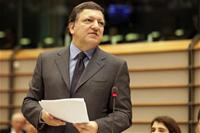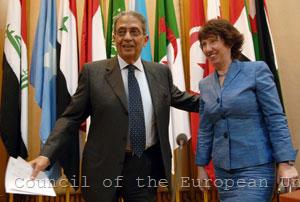A pact under cover
Ralitsa Kovacheva, February 4, 2011
 The first European Council this year will be held "under cover". Formally the topics of the Council are energy and innovation, but actually the highlight of the programme will probably be another Franco-German plan, this time having the bombastic name “a Competitiveness pact”. Of course, the plan itself and the forthcoming discussion on it are a closely guarded secret and officially there is no such item on the European Council's agenda. According to unofficial information, however, the leaders of Germany and France, Angela Merkel and Nicolas Sarkozy, intend to present the pact over lunch.
The first European Council this year will be held "under cover". Formally the topics of the Council are energy and innovation, but actually the highlight of the programme will probably be another Franco-German plan, this time having the bombastic name “a Competitiveness pact”. Of course, the plan itself and the forthcoming discussion on it are a closely guarded secret and officially there is no such item on the European Council's agenda. According to unofficial information, however, the leaders of Germany and France, Angela Merkel and Nicolas Sarkozy, intend to present the pact over lunch.
In his traditional message to the leaders, the President of the European Council, Herman van Rompuy, only mentioned that in the afternoon session attention will be focused on the financial problems of the eurozone. “By March, we aim to decide on a number of reforms to consolidate our finances and protect member states from future crises. On Friday, we will task the EU institutions who shall take charge of the preparations of each element of the reform package.”
These words, however, are too euphemistic to suggest the storm which is now  blustering within the Berlin-Paris-Brussels triangle. Because, as you might guess, European Commission President Jose Manuel Barroso is hardly particularly pleased by the fact that Germany and France have once again ignored the Commission's role, taking the initiative in the euro area governance. Similarly, just before the October European Council last year, both countries issued the Deauville declaration on the economic governance, which demanded Treaty changes in order to establish a permanent rescue fund, as well as political sanctions against eurozone countries violating fiscal discipline.
blustering within the Berlin-Paris-Brussels triangle. Because, as you might guess, European Commission President Jose Manuel Barroso is hardly particularly pleased by the fact that Germany and France have once again ignored the Commission's role, taking the initiative in the euro area governance. Similarly, just before the October European Council last year, both countries issued the Deauville declaration on the economic governance, which demanded Treaty changes in order to establish a permanent rescue fund, as well as political sanctions against eurozone countries violating fiscal discipline.
According to media reports, this “Competitiveness pact" provides for the eurozone countries to introduce the so-called debt brake, to link their pension policies with demographic trends and to harmonise their corporate taxation and labour policies. Although there aren’t many specifics and concrete numbers in the document, there is an obvious attempt to tighten discipline after a German model.
This is the price asked by Germany to support the increase of the bailout fund. France will receive separate Summits of the Eurogroup leaders, on the eve of European Councils, German magazine Der Spiegel reported. In this format the French will have a far more powerful influence than in the EU-27, where they usually encounter resistance from the British or the Poles. Although Germany insisted the pact to be open to the countries outside the euro area wishing to join it, its adoption practically means a “two-speed Europe”, the magazine commented.
The article tells about a meeting between Angela Merkel and José Manuel Barroso by the fireplace in a government guest house near Berlin. Mr Barroso had strongly opposed the idea the European Commission to be isolated from developments in the euro area, and Ms Merkel comforted him, saying that he would be allowed to attend the Eurogroup Summits. Perhaps the magazine has not exaggerated the scale of the insult, because on the eve of the European Council, in a speech before the MEPs Mr Barroso said:
 “… We have recently heard some authoritative voices arguing in favour of deepening economic governance, but at the same time stating that it can only be done through the intergovernmental method.
“… We have recently heard some authoritative voices arguing in favour of deepening economic governance, but at the same time stating that it can only be done through the intergovernmental method.
We have to be clear: the Commission welcomes the deepening and acceleration of economic governance and policy co-ordination, including within the euro area. But we are firmly convinced that the Treaty provides the right framework and instruments to achieve this. In fact, we would not further our cause if parallel structures were to work in an ultimately incoherent manner.” According to Jose Manuel Barroso, it is particularly important to ensue the "community method", fully respecting the role of all the European institutions.
This direct statement, unlike the usual circumlocutory and slippery “Brussels language” of Mr Barroso suggests how deep the conflict between the Commission, on the one hand and Paris and Berlin is, in their attempts to share the power in the euro area. And it is very important who will take the rudder because he will be the one to monitor the compliance with the rules. This is the weakest point in the “Merkel plan”, at least insofar the details of the paper are known: How to ensure compliance with commitments agreed.
It would be a sophisticated cynicism, totally in the spirit of the Deauville deal, if after infuriating the Commission by completely changing the Council's agenda, Merkel and Sarkozy force Barroso to defend personally the need for adoption of the Pact, as it happened with the Treaty changes. But ultimately, the one who pays the bill is the one to determine the rules. And there is no one more interested to win the German support, even under harsh conditions, than the Member States. The European Commission insists the euro area bailout fund to be increased as soon as possible. So in this situation nobody can afford to infuriate Berlin.
 | © euinside
| © euinside | © The Council of the European Union
| © The Council of the European Union | © Council of the European Union
| © Council of the European Union